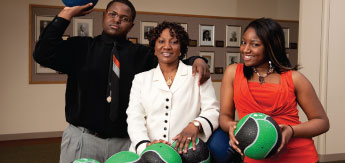In early June, Mattapan United (MU) and Boston Alliance for Community Health (BACH) met with excitement to finalize MU’s affiliation with BACH. Steering Committee members from both organizations discussed the benefits of working together, such as moving toward a shared vision and joining a citywide effort. This is a step in the right direction, not only because it increases collaboration, but decreases the isolation that often happens between neighborhoods. As many neighborhood coalitions have realized, there is beauty and strength in being part of a bigger picture.
For the past two years, both organizations have been working almost in tandem around similar goals and objectives, which is something that happens frequently without notice. In 2010, BACH underwent internal strategic planning and decided to take on the MAPP planning process. The overarching goal was to not only to create a citywide health plan emphasizing social determinants and health equity, but to empower communities and residents to impact structural changes through collaboration.
Meanwhile, MU was forming, with support from Local Initiatives Support Corporation’s Resilient Communities/Resilient Families initiative. Mattapan was one of three neighborhoods funded in a community development planning process that focused on identifying needs, building relationships and empowering residents with the outcome of developing neighborhood priorities and strategies. With such similar outcomes, it only seems fitting that this partnership would begin.
Robert Jenkins, Co-Chair of Mattapan United Steering Committee stated, “we have a collaboration of BACH, Mattapan United, ABCD, Mattapan Food And Fitness, Mattapan Community Health Center and the Boston Public Heath Commission all on the same page in dealing with the heath concerns of Mattapan residents and their families.”
BACH’s learning community is also a useful tool to end fragmentation between neighborhoods. The learning community is a monthly meeting for neighborhood coordinators and other coalition members to come together and discuss the common challenges coalitions face and problem solve through a peer learning process. Karleen Porcena, Lead Organizer with Mattapan United, has been attending the learning community for the past four months. She writes:
“What BACH does, is gives us the ability to share best practices and have a common learning space for groups who are working on common goals…we have recently gone through a community engagement process [in Mattapan] so it is great to be in a position where we are able to share some of our successes and areas that we felt were difficult to other members.” She continues, “it is very exciting to know that we are not alone in our efforts to improve health related issues within our community.”
Despite the advantages of working together, partnerships do not often develop across neighborhood boundaries. Neighborhoods are often in
competition for financial resources and social capital. In the past, there have been many undeserved communities in Boston with similar health inequities all going after the same pot of money, separately. Increasingly, funding sources favor collaboration as a measure of sustainability. While collaboration within a neighborhood is great, neighborhoods working together to address similar challenges also gives the effort strength.
However, collaboration is more than just coming together for financial support. It is the ability to move an agenda forward through community capacity. John Erwin, Executive Director of Conference of Boston Teaching Hospitals and BACH Steering Committee Leadership, stated, “during a time of declining resources, BACH is able to bring together different sectors – neighborhood coalitions, health centers, community organization and hospitals – to work together toward a common goal and leverage each other’s strengths to maximize their collective impact.”
The community health challenges Boston faces are complex and change will only be sustainable when we work at the institutional and system levels as well as “on the ground” with committed residents and community leaders across the city. And this is what BACH strives to do
For more information about Mattapan United, please contact Karleen Porcena at karleen.porcena@bostonabcd.org
For more information about collaborating with BACH, please contact David Aronstein daronstein@hria.org
News
New collaboration with Mattapan offers insight
Posted: June 28th, 2013

